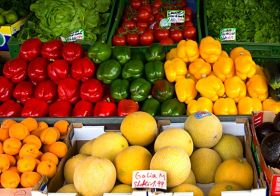Healthy eating
George Perry will provide free produce to children at its Joe Richards Midlands grocery chain to encourage healthy eating

Birmingham wholesaler, George Perry has begun offering free fruit to children at its Joe Richards retail and grocery stores to encourage healthy eating.
The initiative will take place at the firm’s six existing shops at Earlsdon, Erdington, Harborne, and Daventry Road in Coventry, Kenilworth and Tamworth, as well as its new shop at Ball Hill in Coventry.
George Perry managing director Mark Tate said: “It’s through educating and encouraging our children on what to eat now, we will drive obesity down and with the backing of schools and the government, encourage exercise and a general healthier lifestyle.
“Using the shops, we now have the medium to push this forward. Fingers crossed others may follow our venture.”
George Perry has also launched a new online wholesale service, via its new website and Click & Collect Fresh system, which Tate said he sees as “the future of the markets”.
Lincolnshire store offered crate of free fruit to children saying it wants to encourage healthy eating
A Tesco store has impressed shoppers by offering free fruit for children to eat while their parents shop.

The Lincolnshire store put a notice up by a crate full of fruit consisting of: bananas, oranges, apples, berries and other fruit, saying it wanted to encourage healthy eating.
Shopper Vicci Skinn posted a photo of the sign on Tesco’s Facebook page. It said: “Hi parents. Please feel free to take a piece of fruit on us for your children to eat whilst you shop.
“We would like to encourage healthy eating and make your shopping trip that bit easier.
“Enjoy your day and thank you for shopping at Tesco Brigg!!”
Skinn wrote under the post: “I just wanted to say how wonderful it was to see this display in our local Tesco today. After seeing all the sweets out for Hallowe’en this made a refreshing change.”
Tesco responded to the post to say: “Hi Vicci. This is fantastic to see! I’m glad you appreciate the free fruit our store offers.”
Reported move follows on from the success of such products in the fast-food giant’s Indian restaurants

Global fast-food giant Burger King is reportedly keen on introducing more vegetarian items to the menus of its UK restaurants.
The alleged move follows the success of such items in Burger King India, which introduced six vegetarian snacks, sandwiches and entry-level burgers in its offering when the chain began life in the Indian nation in November 2014.
“Looking at the response here, the global management is evaluating introducing some of these options going forward to other vegetarian-friendly markets like the UK,” Raj Varman, chief executive officer of Burger King India, told India’s largest news agency, Press Trust of India.
The National Diet and Nutrition Survey found that nearly one in ten people from the Lothians eats no fruit or veg

Cracks about the Scottish diet are nothing new, but now a new study has shown that nearly one in ten people in the Lothians eats no fruit or vegetables.
The National Diet and Nutrition Survey also found that more than two-thirds of people across the region don’t get their “5 A DAY”, and that over half of all Edinburgh adults are either overweight or obese.
In response to the results, the Edinburgh evening news reports, a drive has been launched to promote healthier eating habits among the region’s population.
Edible Edinburgh is a campaign that brings together the NHS, city council and volunteer-led groups in a bid to change public attitudes to food and encourage people to buy more local produce and grow their own fruit and veg.
Launching Edible Edinburgh, the city council’s environment convener Lesley Hinds told the Evening News: “We all know that a nutritious diet, including plenty of cereals, fruit and vegetables, is essential for a good start in life, and to stay healthy later on.
“Unfortunately, not everyone has access to affordable fresh and healthy food, and we are determined to change that in Edinburgh.”
Researcher: ‘Change in dietary pattern from the traditional British diet substantially lowers risk’
Eating a diet full of fruit and vegetables can slash your risk of a heart attack by a third, according to new research.
Scientists measured blood pressure and heart disease risk factors like high cholesterol in 162 non-smoking men and women aged between 40 and 70.

One group ate what was deemed a ‘traditional British diet’ high in saturated fat, salt and sugar, and low in fibre, oily fish and fruit and vegetables.
The other group consumed a diet full of fruit and vegetables, and lower levels of animal fat, that included oily fish once a week, and restricted sugar and salt intake.
Men and women in the “healthy diet” group were also asked to replace cakes and biscuits with fruit and nuts and supplied with cooking oils and spreads high in mono-unsaturated fats.
The healthy diet was linked to a significant fall in blood pressure, an average reduction in heart rate of 1.8 beats per minute, and an 8% fall in cholesterol levels.
The study, published in the American Journal of Clinical Nutrition, also found men and women over 40 who adapted their diet to meet UK Government guidelines reduced their risk of heart disease by up to a third.
Tom Sanders, of the study team, said: “Our findings apply to middle-aged and older people without existing health problems. This is important because most heart attacks and strokes occur in those not identified as being at high risk.
“We show that adherence to current dietary guidelines which advocate a change in dietary pattern from the traditional British diet (high in saturated fat, salt and sugar, low in fibre, oily fish and fruit and vegetables) would substantially lower that risk.”
Researchers in Canada believe that their findings are due to potatoes’ high concentration of polyphenols
New research has found that potatoes may help prevent weight gain.
According to a new paper published by researchers at McGill University, in Canada, high potato consumption in mice was shown to decrease body weight gain.

The team believe that the research and findings are due to potatoes’ high concentration of polyphenols – a disease-fighting chemical component found in fruits and vegetables.
Professor Luis Agellon, one of the authors of the study, said: “We were astonished by the results. We thought, ‘this can’t be right’ – in fact, we ran the experiment again using a different batch of extract prepared from potatoes grown in another season, just to be certain.”
Over a period of ten weeks, the mice – who started out weighing 25 grams on average – were each fed an ‘obesity-inducing diet’, with some consuming a polyphenol-rich extract made from approximately 30 potatoes.
By the end of the experiment, the animals who hadn’t been fed the potato extract had gained an average of 16 grams.
Those who had consumed the daily dose of polyphenol-rich potato extract, however, put on only 7 grams.
The study was funded by the Natural Sciences and Engineering Research Council of Canada, the Canadian Institutes of Health Research and the Canada Foundation for Innovation.
A Liverpool University study found that McDonald’s children-targeted meals don’t lead to youngsters choosing healthier food.
Adverts for ‘healthy’ McDonald’s Happy Meals are not all they seem, an obesity conference has heard.
A Liverpool University study found that the children-targeted meals don’t lead to youngsters choosing healthier food, and – in most cases – actually make them like fast food more.
According to Mail Online, the researchers said the findings show the power of McDonald’s branding, and accused the fast food giant of quickly and cleverly getting round advertising rules.

In the study, 59 boys and girls aged between seven and 10 years old were shown a series of adverts for toys.
They were then asked to choose a main course, drink and side order from the options available for McDonald’s Happy Meals – the latter of which includes apple slices and a salad pot, alongside French fries.
The children involved in the study were also asked how much they liked junk food, Mail Online reported.
The process was repeated two weeks later – but this time some of the toy commercials were substituted with ones for McDonald’s.
Despite being shown a Happy Meal made up of fish fingers, fruit and a bottle of water, the majority of youngsters still favoured burgers and fries when asked to choose their own meal.
Plus, the UK Congress on Obesity in Birmingham heard, they said they liked fast food more after seeing the Happy Meal ads.
Researcher Emma Boyland said that showing fruit and water rather than milkshakes and chips meant the commercials “cleverly” complied with regulations on the advertising of food to children.
She added that holes in the rules mean that fatty and sugary food can still be advertised during TV programmes like X Factor, despite them being watched by millions of children.
And according to Mail Online, Dr Boyland said that in an ideal world, all such advertising to children would be banned.
She said: “It sounds extreme to say you shouldn’t advertise to children, but children don’t understand persuasion and advertisers shouldn’t be trying to sway children’s choices.”
A spokesperson for McDonald’s said that it adheres to some of the most stringent marketing regulations in the world, has worked hard to improve its menu, and does not advertise fatty and sugary foods to children.